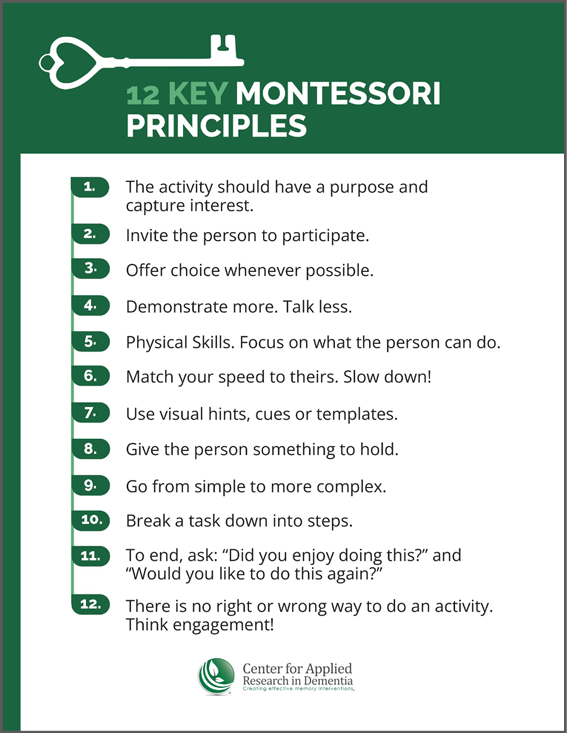
Free Resources
12 Key Montessori Principles for Persons with Dementia
What are the Montessori Principles?
Dr. Cameron Camp describes how we can improve the lives of those living with dementia in the video below.
Hear some heartwarming stories and applications of the 12 Montessori Principles in this playlist with Dr. Camp, who shares his experiences and examples of Montessori in action.

Print It Out!
Print out this flyer of the 12 Key Montessori Principles and hang it somewhere as a reminder to practice the 12 principles every day.
Montessori Mini Lessons
Follow our series where our trainers tackle your tough questions like…
“How do I get my loved one to remember my name?” “What should I do if my loved one is seeing spiders all over their bed?”
And more!
Webinars and Online Events
Share information about your brand with your customers. Describe a product, make announcements, or welcome customers to your store.
-

Montessori: The Ultimate Person-Centered Approach to Leadership Development, Staff Engagement and Dementia Care
Watch VideoEngaging persons with dementia in meaningful activity, creating a community of such persons who care for each other and are connected to the outside world. This approach is the most effective way of reducing responsive behaviors, and results in substantial reduction in the use of psychotropic medications, hypnotics, etc. In essence, it is a way of living which we call the Montessori Inspired Lifestyle®. Though this method initially was developed as an educational system for children, this approach is beneficial for all persons.When applied as a management approach to care partners, it provides a positive work environment, increased autonomy, and high levels of employee engagement. These in turn result in reduced staff turnover, increased longevity, and better communication. Thus, the Montessori Inspired Lifestyle® provides a person-centered care approach through all levels of care systems..
-

Using Montessori Principles to Radically Improve Engagement for Residents and Staff
Watch VideoMontessori believed the most important task of a teacher was not to teach but to observe the students and create an environment that encouraged students to teach themselves and each other what they needed to know when they needed to know it. She achieved amazing results! Similarly, amazing results are achieved when her approach is applied to persons living with Dementia, such as a dramatic reduction in drug use to control unpleasant or aggressive behaviours, reduction in staff & resident injuries, and an increase in level of activity of residents.How powerful it would be if these same principles were applied at the same time to front line staff and those who supervise them. Effectively, this would create a new architecture for workplace culture, making it possible for employees to be the best versions of themselves as often as possible. We will review two case studies from organizations on their successful journey to breathe Montessori Inspired Principles into their organizations. It’s a Human Thing®


